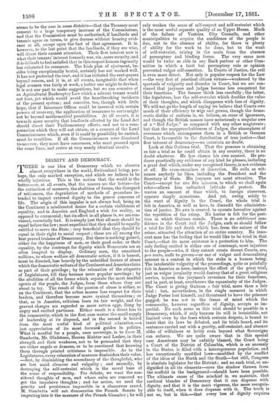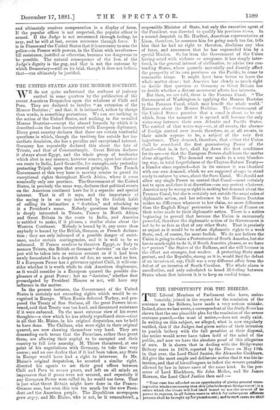DIGNITY AND DEMOCRACY.
THERE is one idea of Democracy which we observe almost everywhere in the world, Switzerland being, per- haps, the only marked exception, and which we believe to be wholly injurious. This is the notion that the world is the better—or, at all events, that the masses are the better—for the extinction of manners, the abolition of forms, the disregard of reticences, the degradation of methods of procedure in- tended to impart external dignity to the graver concerns of life. The origin of this impulse is not always bad, being on the Continent a misdirected desire for a certain visibleness of equality, and in America and England a wish for reality, as opposed to ceremonial ; but its effect in all places is, we are con- vinced, essentially bad. It is simply just that all men should be equal before the law; most expedient that they should be equally entitled to serve the State ; very beneficial that they should be equal in their right to social respect. ; these are all among the best proved truisms of Democracy. But there is nothing gained, either for the happiness of men, or their good order, or their equality, by the contempt for dignity which Democrats are so often tempted to display. Ordinary men, the unnoticed millions, to whose welfare all democratic action, if it is honest, must be directed, lose heavily by the unbridled licence of abuse which the democratic writers of the Continent and America claim as part of their privilege ; by the relaxation of the etiquette of Legislatures, till they become mere popular meetings ; by the abolition of all the forms which separate the most needful agents of the people, the Judges, from those whom they are about to try. The result of the passion of abuse is either, as on the Continent, that the urban masses lose respect for their leaders, and therefore become more cynical themselves ; or that, as in America, criticism loses its fair weight, and the gravest charges are regarded as mere rotten eggs, flung by angry and excited partisans. Either result is a direct loss to the community, which in the first case wastes the small supply of leadership at its disposal, and in the second is barred from the most useful kind of political education,—a just appreciation of its most forward guides in politics. What is needful for a people, once sovereign, is to know M. Gambetta, Mr. Gladstone, Herren Richter and Lasker, in their strength and their weakness, not to be persuaded that they are either angels or demons, or to be convinced that knowing them through printed criticisms is impossible. As to the Legislatures, every relaxation of manners diminishes their value, —first, by diminishing the ascendancy of the thoughtful, who are lost amid clamour and vulgarity ; and secondly, by destroying the self-restraint which is the moral base of the sense of responsibility. For debate, we want the con- sidered thoughts of men, and where rules are removed we get the impulsive thoughts ; and for action, we need the gravity and persistence impossible in a clamorous crowd. M. Gambetta will not democratise the French Senate by importing into. it the manners of the French Chamber ; he will only weaken the sense of self-respect and self-restraint which is the most useful separate quality of an Upper House. Much of the failure of Vestries, City Councils, and other municipalities to acquire the confidence of the people is due, not to the absence of ability, for there is plenty of ability for the work to be done, but to the want of self-restraint, arising in the main from the absence of peremptory and binding forms. The very same men would be twice as able in any Bank parlour or other Com- mittee in which a tacit but peremptory rule or opinion prevented vulgar self-assertion. In Courts of Justice, the evil is even more direct. Not only is popular respect for the Law —the very first of practical citizen virtues—weakened by the spectacle of vulgarity and disorder in Court, but we are con- vinced that jurymen and judges become less competent for their functions. The former think less carefully ; the latter, like legislators, lose the self-restraint which doubles the value of their thoughts, and which disappears with loss of dignity. We will not go the length of saying we believe that Courts owe much of their efficiency to wigs and gowns, though the demo- cratic dislike of uniform is, we believe, an error of ignorance, and though the British masses have notoriously a singular awe of a " Red Judge," as compared with any other magistrate ; but that the unapproachableness of Judges, the atmosphere of reverence which encompasses them in a British or German Court, is favourable to the distribution of true justice—that first interest of democracy—we entertain no doubt.
Look at this Guiteau trial. That the prisoner is obtaining as fair a trial as he could obtain in any country, there is no doubt whatever. He has chosen his own counsel. He pro- duces practically any evidence of any kind he pleases, including a great deal which, under any recognised theory, is not evidence at all. He cross-examines at discretion. He calls as wit- nesses anybody he likes, including the President and the Secretary of State. His jurymen are most attentive. The Court—except for one five minutes, to which we shall again refer—allows him unlimited latitude of protest. He wastes an amount of time which, to foreign observers, appears simply monstrous. And yet, owing solely to the want of dignity in the Court, the whole trial is felt in America, as well as here, to discredit the administra- tion of justice. No awe is created, to operate hereafter against the repetition of the crimp. No horror is felt for the posi- tion in which Guiteau stands. There is no additional con- fidence in the Court and the Judges, such as should follow a trial for life and death which has, from the nature of the crime, attracted the attention of an entire country. No inno- cent man has the feeling that he would like to be tried in that Court,—that its mere existence is a protection to him. The only feeling excited is either one of contempt, most injurious to the people—who, if they cannot create decent Courts, are, pro tanto, unfit to govern—or one of vulgar and demoralising interest in a contest in which the stake is a human being. The intolerable vulgarity of the proceedings, quite as painfully felt in America as here, destroys the effect of the great trial, just as vulgar jocularity would destroy that of a great religious service, injures the jurymen's reverence for their functions, and in part, at least, overthrows the equanimity of the Judges. The Court is giving Guiteau a fair trial, more than a fair trial ; but, nevertheless, in the single moment in which Judge Porter lost himself, and threatened to have the prisoner gagged, he was not in the frame of mind which the community, however regardless of dignity, accepts as im- partial. No such scene as this trial should be possible in a Democracy, which, if only because its will is irresistible, not limited even by the fears which restrain despots, is bound to insist that its laws be debated, and its trials heard, and its sentences carried out with a gravity, self-restraint, and absence alike of wilfulness or levity even beyond what Sovereigns can enforce. We are quite aware that in this special case Americans may be unfairly blamed, the Court being a Court of the District of Columbia, which is an anomaly in the States, is filled with a heterogeneous population, and has exceptionally muddled laws—muddled by the conflict of the ideas of the North and the South—but still, Congress is absolute legislator for the District ; and no such trial, so un- dignified in all its elements—save the shadow thrown from the scaffold in the background—should have been possible. The ultimate cause of the mischief is, we maintain, that cardinal blunder of Democracy that it can dispense with dignity, and that it is the more vigorous, the more recognis- able to itself, when it does dispense with it. The truth is not so, but is this,—that every loss of dignity requires
and ultimately receives compensation in a display of force. If the popular officer is not respected, the popular officer is armed. If the Judge is not reverenced through feeling, he may, and he will at last, secure reverence through force. It is in France and the United States that it is necessary to arm the police—in France with powers, in the Union with revolvers— till resistance, justified or otherwise, becomes too dangerous to be possible. The natural consequence of the loss. of the Judge's dignity is the gag, and that is not the outcome by which Democracy—still on its trial, though it does not believe that—can ultimately be justified.











































 Previous page
Previous page